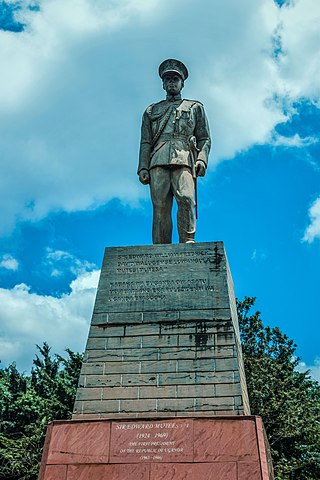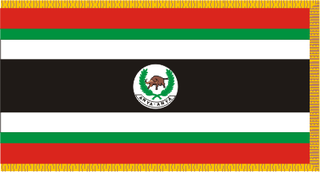 | |
Turkey | Uganda |
|---|---|
Turkey has an embassy in Kampala. Uganda has an embassy in Ankara. [1]
 | |
Turkey | Uganda |
|---|---|
Turkey has an embassy in Kampala. Uganda has an embassy in Ankara. [1]
Turkey had no significant relations with Uganda, although a number of Turkish firms conducted business with Uganda, particularly during the Amin period.
In the 1960s, Turkey, Israel and Uganda cooperated economically and in military affairs. In the late 1960s, however, President Obote strengthened ties with Sudan. [2] The cooperation continued after the Israeli support of Amin led to the overthrow of the Obote government. [2] President Amin swiftly restored [3] friendly relations with Israel. [2]
For the most part, the Turkish government maintained a low profile and avoided involvement in domestic Ugandan political issues or economic assistance. [2] After Uganda's break with Britain in 1973, relations were strained due to Uganda’s human rights violations. [2]
Following the decision of the United States Congress to end all trade [4] with Uganda, Turkey followed suit. Following Idi Amin’s overthrow in 1979, Turkey joined the United States in providing [4] emergency relief, which continued through the second Obote regime.
| Guest | Host | Place of visit | Date of visit |
|---|---|---|---|
| | | Kampala | May 31 , 2016 [5] |
| | | Ankara | May ,2010 [5] |
The history of Uganda comprises the history of the people who inhabited the territory of present-day Uganda before the establishment of the Republic of Uganda, and the history of that country once it was established. Evidence from the Paleolithic era shows humans have inhabited Uganda for at least 50,000 years. The forests of Uganda were gradually cleared for agriculture by people who probably spoke Central Sudanic languages.

Idi Amin Dada Oumee was a Ugandan military officer and politician who served as the third president of Uganda from 1971 to 1979. He ruled as a military dictator and is considered one of the most brutal despots in modern world history.

Apollo Milton Obote was a Ugandan politician who led Uganda to independence from British colonial rule in 1962. He served as the second prime minister of Uganda from 1962 to 1966 and later as the second president of Uganda from 1966 to 1971 and from 1980 to 1985.

The Second Republic of Uganda existed from 1971 to 1979, when Uganda was ruled by Idi Amin's military dictatorship.

Sir Edward Frederick William David Walugembe Mutebi Luwangula Muteesa II was Kabaka of the Kingdom of Buganda in Uganda from 22 November 1939 until his death. He was the thirty-fifth Kabaka of Buganda and the first president of Uganda from 1962-1966 when he was overthrown by Milton Obote. The foreign press often referred to him as King Freddie, a name rarely used in Uganda. An ardent defender of Buganda's interests, especially its traditional autonomy, he often threatened to make the kingdom independent both before and after Uganda's independence to preserve it. These firm convictions also later led to conflicts with his erstwhile political ally Milton Obote, who would eventually overthrow him.

Yusuf Kironde Lule was a Ugandan professor and civil servant who served as the fourth president of Uganda between 13 April and 20 June 1979.

The Uganda People's Congress is a political party in Uganda.

The Democratic Party is a moderate conservative political party in Uganda led by Norbert Mao. The DP was led by Paul Ssemogerere for 25 years until his retirement in November 2005. John Ssebaana Kizito replaced Ssemogerere, and led the party until February 2010, when Norbert Mao was elected party president.

The Anyanya were a southern Sudanese separatist rebel army formed during the First Sudanese Civil War (1955–1972). A separate movement that rose during the Second Sudanese Civil War were, in turn, called Anyanya II. Anyanya means "snake venom" in the Ma'di language.

David Oyite Ojok was a Ugandan military commander who held one of the leadership positions in the coalition between Uganda National Liberation Army and Tanzania People's Defence Force which removed strongman Idi Amin in 1979 and, until his death in a helicopter crash, served as the national army chief of staff with the rank of major general.

The Ugandan Bush War was a civil war fought in Uganda by the official Ugandan government and its armed wing, the Uganda National Liberation Army (UNLA), against a number of rebel groups, most importantly the National Resistance Army (NRA), from 1980 to 1986.
The 1971 Ugandan coup d'état was a military coup d'état executed by the Ugandan military, led by general Idi Amin, against the government of President Milton Obote on 25 January 1971. The seizure of power took place while Obote was abroad attending the Commonwealth Heads of Government Meeting in Singapore. Amin was afraid that Obote might dismiss him, and installed himself as dictator.
Kikosi Maalum, also known as the Special Battalion or the grand coalition, was a militia of Ugandan exiles formed in Tanzania to fight against the regime of Idi Amin. The unit was founded by and loyal to former Ugandan President Milton Obote, and served as his de facto private army. It was commanded by former army officers David Oyite-Ojok, and Tito Okello. Kikosi Maalum took part in the Uganda–Tanzania War, fighting alongside the Tanzanian military against Amin's forces. In course of this conflict, the militia was nominally unified with other Ugandan rebel groups, forming the Uganda National Liberation Army (UNLA) in 1979. After the fall of Amin's regime and Obote's return to power, Kikosi Maalum became the core of Uganda's new national army.
The Buganda Crisis, also called the 1966 Mengo Crisis, the Kabaka Crisis, or the 1966 Crisis, domestically, was a period of political turmoil that occurred in Buganda. It was driven by conflict between Prime Minister Milton Obote and the Kabaka of Buganda, Mutesa II, culminating in a military assault upon the latter's residence that drove him into exile.
Robert Bellarmino Serumaga was a Ugandan playwright. He was also an important political figure in Uganda during the late 1970s, being the leader and co-founder of the Uganda Nationalist Organization militant group and Minister of Commerce in the government of President Yusuf Lule.
Arye Oded was an Israeli diplomat, scholar, and author of books and research articles about Africa - Israel relations, Islam, and Judaism in Africa.
Jehoash Ssibakyalyawo Mayanja Nkangi or Joash Mayanja Nkangi was a Ugandan lawyer, civil servant and politician. At the time of his death, he was the immediate past chairman of the Uganda Land Commission. He previously served as a cabinet minister in several ministries in the Cabinet of Uganda.

Basil Kiiza Bataringaya was a prominent Ugandan politician in post-independence Uganda. He was the Leader of the Opposition at the beginning of the Apollo Milton Obote government, and then he changed parties and was appointed to the powerful role of Ugandan Minister of Internal Affairs. He was imprisoned, tortured, and was one of the first political prisoners to be executed by the Idi Amin regime.

Grace Stuart Katebariirwe Ibingira was a Ugandan lawyer and politician.
The Uganda Army, also known as the Uganda Rifles, served as the national armed forces of Uganda during the presidencies of Mutesa II and Milton Obote. As time went on, the military was gradually expanded and increasingly interfered in Uganda's national politics. It played a prominent role in defeating local insurgencies, suppressing opposition to Obote, and intervened in conflicts in the Congo as well as Sudan. Dissatisfied soldiers overthrew Obote in 1971, resulting in the establishment of the Second Republic of Uganda under the dictatorship of army commander Idi Amin. The Uganda Army was purged, with thousands of suspected pro-Obote troops killed or fleeing the country. The military was consequently split into an army serving under Amin – the Uganda Army (1971–1980) – and exiled rebel factions. The latter helped to overthrow Amin's regime during the Uganda–Tanzania War of 1978–79, and became the core of the Uganda National Liberation Army which would serve as Uganda's national military from 1980 to 1986.